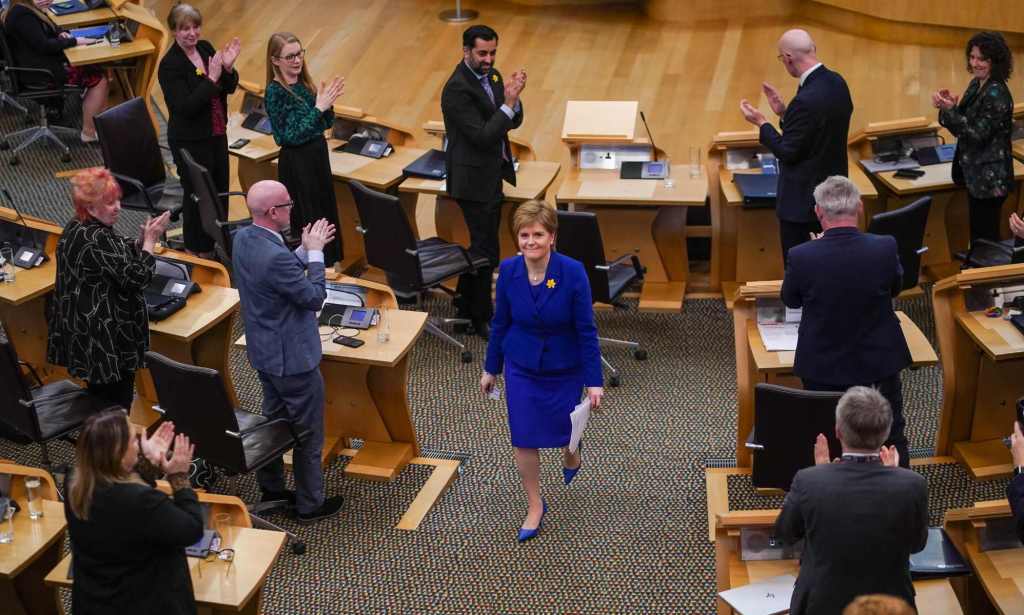SNP leadership: Humza Yousaf becomes next first minister of Scotland

The SNP leadership winner Humza Yousaf. (PinkNews)
Humza Yousaf has won the SNP leadership race, and will become the next first minister of Scotland.
Yousaf beat rival Kate Forbes with 26,032 second preference votes to 23,890. Once approved by the Scottish parliament, he will become Scotland’s first minister on Tuesday (28 March).
The current health minister and a firm LGBTQ+ ally, Yousaf will be the first Muslim and first person of colour to be first minister.
LGBTQ+ members are breathing a sigh of relief – Yousaf’s main rival Kate Forbes had been heavily criticised for her views on same-sex marriage and for suggesting conversion therapy could be a choice.
Both Forbes and third-place runner Ash Regan had opposed gender recognition reform.
“48 per cent voted for candidates who were not going to be very good for LGBT rights or for women, so there’s work to do,” Erin Lux, co-convenor of the SNP’s LGBTQ+ group Out for Independence, told PinkNews. “But we’ve carried the day and we’re looking forward to working with Humza.”
Yousaf, Forbes and Ash Regan have been vying for the top job since the ballot opened to the party’s 100,000 members on 13 March.
The SNP leadership race highlighted the stark divide that exists within the party, with LGBTQ+ rights becoming a focal point of the campaign.
Kate Forbes, in particular, caused a storm on the very first day of her campaign when she said she would not have voted for equal marriage had she been an MSP at the time.
Forbes, the member for Skye, Lochaber and Badenoch, is a member of the Free Church of Scotland.
She said: “I think for me, Angela Merkel is the example I would follow, I would have voted, as a matter of conscience, along the lines of mainstream teaching in most major religions that marriage is between a man and a woman.
“But I would have respected and defended the democratic choice that was made. It is legal right now and I am a servant of democracy, I am not a dictator.”
At the same time, Forbes told the BBC she had “significant concerns” about self-ID for trans people in Scotland, having opposed Nicola Sturgeon’s attempts to reform the Gender Recognition Act.
Where does Humza Yousaf stand on LGBTQ+ rights?
Humza Yousaf was the only SNP leadership candidate to support gender reform and to enthusiastically rally for the LGBTQ+ community. He told PinkNews if he became first minister, he would put LGBTQ+ rights at the heart of an independent Scotland’s constitution.
In regards to Forbes’ comments on same-sex marriage, Yousaf, who is a practicing Muslim, told Times Radio that while he cannot change what “Islam says about gay marriage”, his religious beliefs would not have basis when he is crafting policy for the Scottish people.
He stands firmly behind the rights of same-sex couples. During the race, Alex Salmond suggest Yousaf had tried to dodge a vote on marriage equality in 2014. Yousaf made clear that he had an “unavoidable” meeting and believed in gay rights.
Immediately after winning the leadership, Yousaf promised to see through a legal challenge against the UK government’s decision to block Scotland’s gender recognition reform.
“They do not have any right to use that excessive justified power given that the majority of Hollywood, of course, backed the GRR bill.
“My first principle, my starting principle, is to challenge that Section 35 order,” he said.
He has also vowed to ensure conversion therapy is banned in Scotland, telling PinkNews he would be prepared to bring forth his own legislation if needed.
Like Forbes, Regan opposed Scotland’s gender reform law and told the Sunday Mail she would revoke the legislation if elected.
However, she “firmly” stated her support for same-sex marriage.
Nicola Sturgeon bows out after tricky SNP leadership race

Nicola Sturgeon delivered her final speech as first minister on Thursday (23 March) after eight years in the role, outlining her party’s achievements during that time as well as what the job has meant to her.
Addressing the chamber at Holyrood, Sturgeon said the role of the first minister had been “challenging, exhilarating and exhausting” but was also the “privilege of my lifetime”
“After 35 years in politics, 24 years in parliament, 16 in government and more than eight as first minister, it is time for Nicola Sturgeon the politician to make a bit of space for Nicola Sturgeon the person,” she said.
“Next week we will find out whose portrait will go alongside mine on the stairwell of Bute House.
“Subject to this chamber’s approval, it will either be Scotland’s second female first minister, or the first from a minority ethnic background.
“Either way, it will send the powerful message that this, the highest office in the land, is one that any young person in Scotland can aspire to.
“Never forget that every day in this office is an opportunity to make something better for someone, somewhere in Scotland.”
Sturgeon resigned on 15 February, triggering the first real SNP leadership race in almost 20 years. She was elected without contest in 2014, replacing Alex Salmond, who was elected in 2004.
How did this story make you feel?

